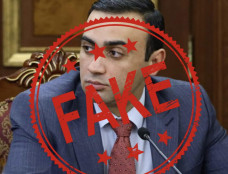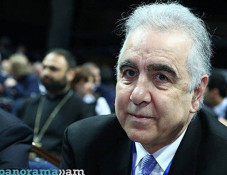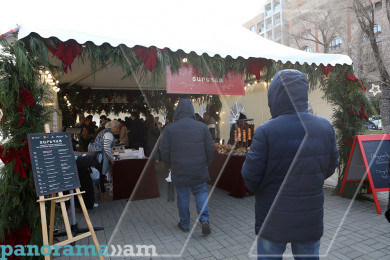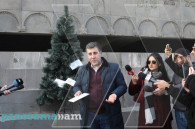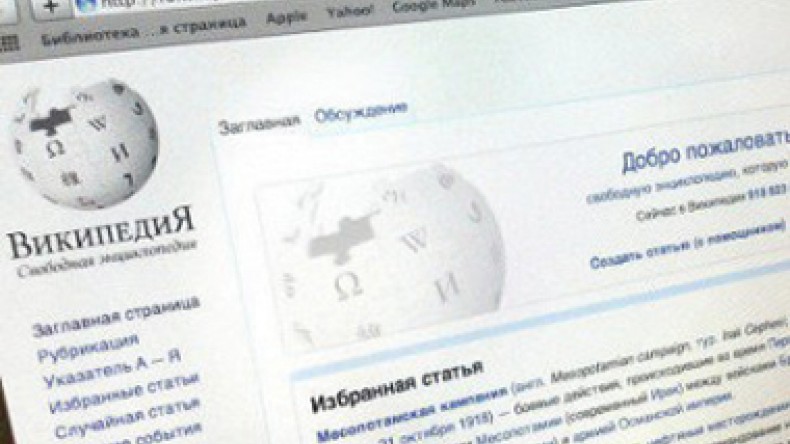
Article about Azerbaijani hero of Great Patriotic War deleted from Wikipedia due to contradicting sources
After four months of large-scale discussions in the Russian Wikipedia, the article about Ahmadiyya Jabrayilov, a “legendary figure in the French Resistance and Charles de Gaulle’s best friend,” was removed from the online encyclopedia due to the contradictions between the numerous sources and source documents under discussion, as well as the impossibility to trust the authenticity of none of the facts presented in it, according to an article published in Wikimedia.
“This puts an end to the Wikipedists’ massive research which involved archives, specialized organizations and scientists from Russia and France. The discussion turned into battles between Wikipedists and included megabytes of photos, videos and unique documents. The hard work resulted in a complete unmasking of quite a memorable Soviet-era myth,” the article reads.
According to the authors, the article about Jabrayilov, created in April 2007, was based on materials from Soviet and post-Soviet World War II literature about a Soviet soldier of Azerbaijani origin, who was captured by the Germans in the territory of France, escaped from the concentration camp and joined the French guerillas. According to the story, he was decorated with numerous French awards as a Resistance figure, but remained unknown for a long time after returning to the USSR. In June 2015, however, the article about “such a heroic personality” was proposed to deletion, because “being a person, whom de Gaulle, accompanied by a number of French journalists and biographers, wished to meet in person, Ahmed Michel was supposed to leave some track,” according to Divot-у, the user proposing the deletion. “Currently, there are still no relevant French sources. Delete.”
The doubtful data and “film-like” biography versions, as well as the lack of non-Soviet sources drove the Wikipedia contributors to explore new information and study what there was in their possession. They made inquiries at archives, museums and historical organizations. The work with such a huge variety of sources of information about Jabrayilov’s heroic life enabled the Wikipedists to thoroughly verify the chronology of events and cross out the obviously wrong statements. In particular, Madatov’s book was withdrawn from consideration, which claimed Jabrayilov had “made a speech from behalf of the Soviet soldiers and was warmly met by the French patriots” during a rally in liberated Paris on 20 August 1944. In reality, Paris was liberated on 25 August. Moreover, the online bases containing data about people involved in the World War II helped the researchers to find out that Jabrayilov could not have been a prisoner in Dachau. Memorial database did not include any information about Ahmadiyya Mikayil oglu Jabrayilov, either.
Foreign archives also confirmed the doubtfulness of the information about Jabrayilov’s exploits presented in various variations. According to the story, a detachment led by some captain Delplanque was deployed in Toulouse and Jabrayilov joined it after his escape to “liberate Bordeaux” with them. However, in answer to the inquiries, the Museum of Resistance in Toulouse said Victor Delplanque did not take part in the Resistance in the south of France, but in the north. The museum also noted that Delplanque/Delplangue was not mentioned either in the archives of the Resistance in Haute-Garonne (Toulouse is its capital), or in Michel Goubet’s book about the Resistance in Haute-Garonne.
Further, a study of all the issues of the newspaper Baku Worker another author, Mikhail Semiryaga, references in his book, where he recounts Jabrayilov’s biography in detail, was conducted. The series of stories about Jabrayilov, who spent a couple of hours buried alive in a coffin before the French guerilla soldiers dug him out, rose more doubts. The authors also found it incredible that Jabrayilov could participate in Paris and Bordeaux liberation, which were separated by 3-days distance. Remarkably, Bordeaux was liberated before Paris, according to Semiryaga, while in reality it was vice versa.
The archive documents about Jabrayilov kept in his house museum in Shaki were also analyzed. Among the documents, the researchers found a letter sent to Jabrayilov from Louis Lаbarey, a real participant of Resistance. The letter, however, does not contain any information about Jabrayilov’s concrete role and deeds in the Resistance.
Remarkably, the “original” documents, which were allegedly proofs of Jabrayilov’s participation in the Resistance, were written with gross mistakes, and two of them have entirely identical photos, including the paper and photo defects. “Hence, both of the French documents, which are meant to prove Jabrayilov’s participation in the Resistance till August 1945 (the implied time of escape from the eastern legion) look extremely questionable and most likely are written by a someone, who is not a native speaker of French,” the Wikipedists conclude. They also add that the rest of the documents were issued after August 1944 and no not contain any certain information about Jabrayilov’s military operations or received awards.
Wikipedia editors also cast doubt on the version of Jabrayilov’s “French wife,” Sara, due to the lack of information about wife or children in the presented documents.
As another proof of Jabrayilov's participation in the French Resistance, photos of his awards were presented. However, a thorough analysis of the medals revealed that one of them is a “Commemorative medal of war 1914-1918” awarded on 23 June 1920. Jabrayilov could not receive it because he was born after the war and could not take part in it. The second one, Croix du combatant, with a ribbon of a certain type, was again handed before 1941 and only to participants of the World War I. The ribbon was later changed and recovered only in 1948 when Jabrayilov had already left France. A part of the medals is hanged from ribbons of American awards, and another part constitute medals granted on the 60th and 65th anniversaries of victory, although Jabrayilov was already dead by then and it was his son, Jevanshir Jabrayilov, the director of the museum, who received them.
A document sent from France put a final full stop to “Jabrayilov’s case.” The document confirmed that there was no Ahmadiyya Jabrayilov mentioned either in the archives of the French guerillas of Tarn-et-Garonne or in the list of the Resistance medal receivers.
“The discussion stopped at this stage. A decision was made to delete the article from Wikipedia; the accumulated amount of contradicting information exceeded the limit allowing the contributors to write an encyclopedic article in accord with Wikipedia rules to reference respected sources not contradicting to each other,” the authors sum up.
Remarkably, among the documents presented at Shaki museum, there is a statement Jabrayilov wrote to the Paris police about the theft of a briefcase whose contains were quite strange given that it belonged to an average guerilla – 16.200 francs, two pairs of watches and four pens.
Newsfeed
Videos










